- Home
- Alton Gansky
Beneath the Ice Page 8
Beneath the Ice Read online
Page 8
Gleason turned and faced the women. “I know we brought more batteries for those things.” He searched the small room and found nothing. “I saw them in here before.”
Gwen’s chest tightened. “But you have power to the main radio, right?”
“Yeah,” Gleason said. “At least the light is on, but I’m not getting output.”
“The satellite phone . . .” Sarah suggested.
Gwen knew right where that was and grabbed it from its charger stand that rested on a small fold-up desk. As with the radio, she activated the power switch and felt her heart drop like a rock in a well. No power. She opened the back and again found an empty place where a battery should have been.
“What’s going on here?” she asked, tears welling.
She watched as Sarah raised the handheld to her ear and shook it. There was a tinkling sound. “That can’t be good,” she said.
Gwen shook the radio in her hand and heard the same thing. She repeated that action with the satellite phone. More noise.
“I need a screwdriver,” Sarah demanded.
“What are you doing?” Gwen demanded.
“I’m taking this thing apart.”
“You’ll ruin it,” Gwen protested.
“I think someone has done that for us.”
“I’ll open the radio,” Gleason said.
“Turn the power off first,” Sarah said.
“Yeah, that’s the first thing they taught me at MIT.”
“Sorry, Gleason,” Sarah said. “I’m a little edgy.”
“No sweat. I’m a little nervous myself.”
“I’m not sure we should be doing this,” Gwen admitted, but she had no better idea.
“Let me work,” Sarah said. “I’m a robotics expert, so I know circuits. I know electronics.”
Gwen wanted to object, but her rational mind told her Sarah was right. She watched as Gleason and Sarah stripped the casing off the equipment.
“I don’t believe this,” Sarah said, holding out the radio. “It’s been sabotaged.”
Looking at the radio Sarah held, Gwen could see loose parts broken off from the circuit board.
“Same here,” Gleason said.
“How? Why?” Gwen asked. Her voice caught on the words.
“Acid,” Gleason said. “It wasn’t enough to take the batteries or clip the power cord. Someone wanted to make sure the radios never worked again. I can see where some kind of acid was squirted on the circuits. Let me see your radio.” He took the handheld from Sarah’s hand. “Same thing. It looks like they squirted the acid through the notch where the battery wires run between the battery bay and the electronics.”
“Who would do that?” Gwen asked.
“That is the big question,” Gleason replied.
Gwen’s knees went weak, and the blood drained from her face. “That means . . . that means . . .”
“The plane crash was no accident,” Sarah said, uttering the thought Gwen could not put words to.
“The others may be in trouble,” Gwen exclaimed. “If we don’t have radios, then they don’t either.”
“It’s worse than that,” Gleason said. “If the plane crash was intentional, I doubt the party responsible would have boarded.”
Gwen looked at Gleason then blinked several times. “You mean that the saboteur is one of us?”
Gleason nodded, and his face darkened.
Outside, the wind screamed around the Dome as if in a fury of pain.
Chapter 8
Perry felt sickened. Not by the gruesome sights—and there had been plenty of those—but by his failure to find a single survivor. So powerful was the crash that he had been unable even to find a whole body. Body parts—arms, legs, hunks of flesh—were abundant, but he’d seen nothing to give him a thread of hope to cling to.
Leaning into the rising wind, Perry looked into the faces of the others, each bearing the scars of shock. He made eye contact with each one but said nothing. Nothing could be said. It had been a fool’s errand from the beginning, but it had been necessary.
Perry bowed his head. He could hear only the sound of the wind whipping around his body and the thundering of his own heart. Never had he felt so helpless; never had he felt so sad. Thousands of miles to the north, wives waited to hear from husbands, and children were eager to tell Daddy the latest news from school and the neighborhood. Mothers, fathers, brothers, sisters, and friends were a phone call away from horrific news—news that would leave a scar not even time could remove.
And Perry felt responsible. No one would blame him. No inquiry could ever say that he had been careless. But the fact remained: Six of his best employees were dead, burned and scattered across a desert of ice.
His throat tightened, and he felt broken inside as if pieces of his being had frozen, shattered, and fallen into an unrecognizable heap. Emotions bubbled. He was brokenhearted and furious, depressed and despondent. He stood in the cold, in the barrenness, unable to do anything else. Grief had paralyzed him, welding his feet to the ice. Since his mind could not pray, his heart did.
Moments crept by, then he felt something across his shoulders. He didn’t need to look up to know his friend Jack had put his beefy arm around his shoulders. It said more than any poet could.
Perry took several deep breaths then said, “Someone contact base and let them know what we found.”
“I’ll do it,” Griffin said softly. It was the first time Perry had heard the man speak in a whisper. He stepped several yards away, and Perry watched as he put the handheld radio to his lips, then raised it to his ear to hear better.
“You okay, buddy?” Jack asked, shouting against the wind.
“No,” Perry admitted. “I don’t think I’ll ever be the same.” He looked along the field of debris. To his left he could see the inverted tail section, to his right the conical nosepiece lying on the ice like a rounded pyramid.
“None of us will ever be the same,” Jack said.
“That’s for sure,” Larimore added.
“There’s something wrong with the debris field,” Perry said, forcing his mind to work on facts instead of stewing in emotion.
“Yeah, I noticed that, too,” Jack said.
“I know crash reconstruction is a specialty best left up to FAA and NTB types, but the pattern of debris is . . . unexpected.”
“What do you mean?” Larimore asked. “How should it look?”
Perry glanced up and down the rubble again. “At first, I thought the crater was where the plane hit, but that can’t be. The tail section is behind the crater, and the nose section is on the leading edge. If the C-5 had nosed in, then I’d expect to see the front end of the plane in the hole or at least having created a long gouge.”
“But the front of the plane is in the front, and the back is in the back,” Jack said.
“Meaning?” Larimore pressed.
“That it came apart in the air,” Perry replied. “The debris runs out to the side more than I expected. And the bodies . . .” Images of bodies ripped into pieces and falling to the ice inundated Perry’s brain. “We didn’t find a single intact body. Not one.”
“It blew up in midair?” Jack said. “Is that what you’re saying?”
“Exactly.”
“There weren’t any explosives on board,” Larimore said.
“None that we know of,” Perry countered.
Griffin jogged over to join the others. “Something is wrong, guys. I can’t raise the base. My walkie-talkie is dead.”
Perry examined his radio. “I know I turned this on when I left.” He checked the power switch. It was in the on position but the indicator light was dark. He brought it to his lips. “Check . . . check.” Nothing. “We should be hearing that over your radios.”
The others quickly checked their units. All of them were silent.
“I don’t like this,” Griffin said.
“Neither do I.”
“It gets worse,” Jack said. “The wind is picking up. Going b
ack we’ll be driving into a headwind. It was hard enough when it was behind us; I don’t think we can make it going head-to-head with it.”
“Which was my initial concern,” Griffin retorted.
“Well, we can’t stand out here,” Larimore said. “I can’t feel my feet as it is.”
“We didn’t bring shelter,” Griffin complained. “If you had listened to me—”
“We’ll have to make shelter,” Perry said. Then it occurred to him. “Follow me.” Without wasting a moment, Perry mounted his snowmobile, Griffin behind him.
“Where are we going?” Griffin asked.
“You’ll see.” Perry accelerated and moved toward the distant end of the debris field. Moments later, he stopped by the inverted nose section of the downed C-5. It towered above the flat ice. The front landing gear skid lay ten yards farther along.
“What are we doing here?” Griffin asked.
Perry waited until Jack and Larimore joined them. “If we can find an opening, we can use the nose section for shelter against the wind.”
“Great idea,” Jack replied and dismounted. It took only a minute to find a tear in the skin large enough to crawl through. Perry was relieved. He had no desire to dig through the ice to tunnel underneath. Fortunately, the opening was on the leeward side. Wind wouldn’t be pouring in, but it would make itself known.
Perry crawled in. The others followed. It was dark, but without the wind pounding them, it felt warm.
“A metal igloo,” Jack said, as he crawled through. “Any port in a storm as they say.”
Perry nodded in the darkness and struggled with the irony that surrounded him. Not long before, this piece of fuselage had been part of the deathtrap that took the lives of six of his men, six Sea-bees, and the C-5’s crew. Now it was the one thing that separated them from death. It was like making a lifeboat out of the Titanic.
“Who would do this?” Gwen asked.
It was the third time Gleason had heard it, but he said nothing. The woman was controlled but well stretched into her fear zone. It was normal. It was to be expected. Gleason wasn’t sure if he was telling himself that to feel better about Gwen or to comfort himself about his own fears.
“We have no way of knowing,” Sarah said. “At least not right now. What we need to do is remain calm and focus on the problem.”
“Who made you queen?” Gwen groused. “For all I know, you’re the one who did this. You said it yourself . . . you know electronics.”
“You’re a better suspect than I am,” Sarah said. “You and your whiny brother have made it clear from the beginning that you’re opposed to the mission. Makes me wonder why you’re even here.”
“Because we didn’t know you were going to puncture the ice sheet. Had we known, we would have turned it down flat.”
“Feel that strongly, do you?” Sarah prodded.
“Absolutely.”
“Strongly enough to do something about it? Strongly enough to—oh, I don’t know—destroy our communications equipment?”
“How dare you!”
“Easily. You’re the biologist. It would be easy for you to obtain enough acid to do this.”
“You sniveling little—”
“Enough!” Gleason had tolerated all he could. He was shocked by his tone. A quiet man, he had trouble remembering the last time he raised his voice. “If you ladies want to duke it out, then take it outside. If not, let’s pull our collective brains together and think this through.”
“What is there to think about?” Gwen complained. “My brother may be on the ice with someone responsible for not only sabotaging our radios but bringing down an airplane full of people.”
“Maybe,” Gleason agreed, “maybe not. The perpetrator may have been on the plane.”
“And killed himself?” Sarah interjected.
“It’s been done before, and that’s assuming the crash was intentional. It may have been an accident.”
“Do you really believe that?” Sarah asked.
Gleason frowned. “As much as I want to, no. Arguing isn’t going to unwind time. We need information. We need communication.”
“You’re right,” Sarah admitted. She turned to Gwen. “I’m sorry. I guess I’m more on edge than I realize.”
Gwen stood silently, fire smoldering in her eyes. Gleason saw Sarah shrug then turn her attention to him. “Maybe we can build one good radio out of the ones we have here. You know, piece one together.”
“Perhaps,” Gleason said, “but we need to do something else first.” He started for the door. “We need to find out if we are alone or if someone chose to stay behind.”
“I suggest we stick together,” Gwen said. Gleason noted that her words were missing some of their former heat.
“Agreed,” Gleason said.
“No argument here,” Sarah added.
Gleason led them from the communications cubicle.
It seemed wrong to Perry. The discomfiture was rooted in emotion; he knew that. Still, taking shelter in the damaged remains of the C-5’s nose section—a nose that had been amputated only a few hours before—struck Perry as a cruel irony. The shelter was needed. The wind continued to race, to scream, to claw with invisible fingers at the four men who huddled among wires, cables, metal struts, and things too difficult to identify with the meager light that puddled in through the sheet-metal tear.
To insulate themselves from the ice floor, Perry and Jack had gathered bits of broken crates from outside and carried them back into the makeshift shelter. Each man sat on some arrangement of wood.
The sun was still up, hovering over the horizon like a balloon that had lost too much helium to climb any higher. It would stay up not for hours, but for weeks. Since arriving in Antarctica, Perry had not seen the sun set. He was glad it wouldn’t be setting today.
The sight of wreckage and dismembered bodies haunted Perry’s thoughts. He tried to push them away, to perform a mental, emotional exorcism of the demon images, but his normally disciplined mind failed. The images would be with him forever.
“I think I accounted for all my men,” Larimore said. He sat crossed-legged on several pieces of wood. His head was down, his shoulders slumped. The body said it all. “Best I could tell anyway.” His words sounded like a whisper against the wind’s clamor.
Perry looked at the man. “Did you know them well?”
Larimore shook his head. “No. Not really. It was a new command for me, a new station. I knew their names, read their files and proficiency reports, but hadn’t had time to get close. You’re not supposed to get close to those under your command. It makes it hard to send them into harm’s way.”
“Still, you’re human,” Jack said.
“Yeah, that’s the hard part.” Larimore sighed. “I’ve never lost a subordinate before. Never. Working with the equipment we do, there are bound to be injuries. I have had a few of those, but no deaths. I’m afraid I feel . . . awkward.”
Perry understood. Like most men, he was uncomfortable with certain emotions. Larimore was the same. Awkward was a good word. What Perry was feeling—an emotional stew of shock, sadness, grief, anger, and a dozen other emotions he couldn’t identify—was impossible to describe. It was beyond definition, but it was real.
“What about you?” Larimore asked. “From what I saw, you were close to your men.”
Something stuck in Perry’s throat. “As close as life would allow. Sachs Engineering has over a thousand employees, so I can’t say I know every one of them. I chose these six, however. I had worked with them before on one project or another. They were the best and most trusted men I could find.”
“How trusted?” Griffin asked. His tone was spiced with
suspicion.
“What do you mean?” Perry asked.
“I’ve been thinking,” Griffin explained. “I think you’re right. Something isn’t right about the way the plane came down. The crater is wrong, the debris is wrong, and the bodies—” he shuddered—“the bodies are wrong.”
“So now you’re a crash expert?” Larimore said.
“As much as anyone in this . . . place. Why don’t you get off my back?”
“Someone needs to be on your back. You’ve been nothing but a pain in our rear ends since we landed.”
“And you’re a pompous military elitist who—”
“Say it, and they will be the last words you utter!” Larimore shouted. He reached for Griffin but was cut off by Jack’s outstretched arm, an arm that moved with unsettling speed and grabbed a fistful of the commander’s parka. Larimore wasn’t going anywhere.
“At ease, Commander,” Jack said evenly. “When we get back to base, I’ll build you two a boxing ring. Right now we need cooperation, not combat.”
Larimore settled back into his seat. “You’re right. I’m sorry. This thing has me . . . I’m not myself.”
“I doubt any of us are,” Perry said. “Go on, Dr. James, but keep the snide remarks to yourself.”
“Okay, okay,” Griffin said. “I’m not very good in social settings.” He looked around the shelter and let slip a small laugh. “If you can call this a social setting.”
“You were talking about things not looking right,” Jack prompted.
“Perry said it earlier. It looks like the plane blew up in midair. How does that happen? Planes like this have been the workhorse of the Antarctic. Their safety record is excellent. If there weren’t ex-plosives on board, then how did it blow up?”
“A spark in the fuel,” Larimore suggested.
“Possible, I suppose,” Griffin said, “but while you were combing the field of debris for survivors—and clearly there could be none—I spent a little time looking at what’s left of the fuselage. This is way out of my field, but I know enough physics to recognize a hole caused by an explosion.”
“You found such a hole?” Perry asked.
“More than one,” Griffin said.
“A fuel explosion would do the same thing,” Larimore said.
“Fuel is kept in the wings, right, Commander?” Griffin asked.

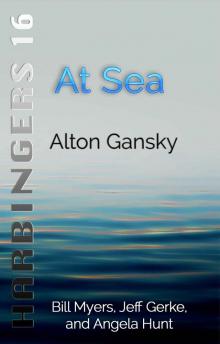 At Sea (Harbingers Book 16)
At Sea (Harbingers Book 16)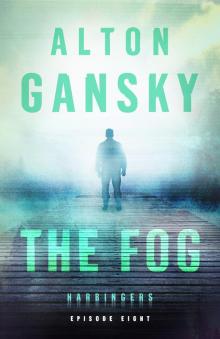 The Fog
The Fog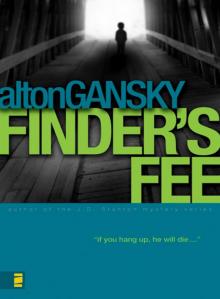 Finder's Fee
Finder's Fee Wounds
Wounds End Game (Harbingers Book 20)
End Game (Harbingers Book 20)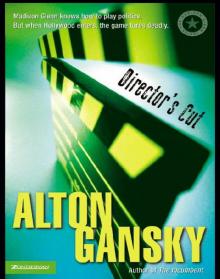 Director's Cut
Director's Cut Zero-G
Zero-G By My Hands
By My Hands The Village (Harbingers Book 12)
The Village (Harbingers Book 12) Beneath the Ice
Beneath the Ice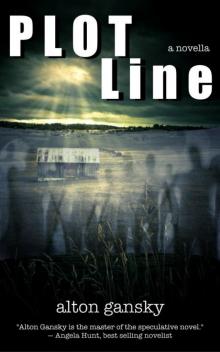 Plot Line
Plot Line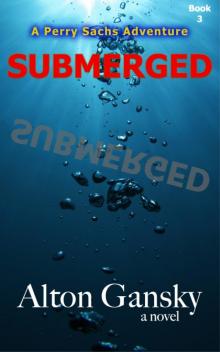 Submerged
Submerged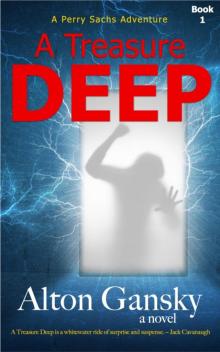 A Treasure Deep
A Treasure Deep